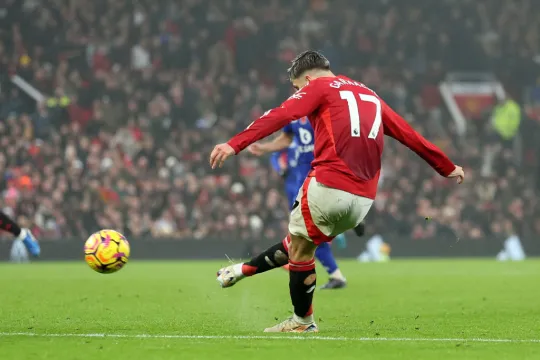Alejandro Garnacho’s recent public criticism of manager Ruben Amorim has cast doubts over his future at Manchester United. After being named on the bench for the Europa League final against Tottenham, Garnacho openly expressed frustration, hinting this might mark the end of his time at the club.
Garnacho said he had played in every previous round but only got 20 minutes in the final. While Amorim has not publicly responded, reports suggest the manager confronted Garnacho in a heated team meeting, reportedly telling him to “pray” he finds a new club this summer.
This isn’t the first time Garnacho’s discipline has been questioned. During Erik ten Hag’s tenure, the young winger was criticized for immature social media posts and was even dropped for the Manchester derby. A previous incident involved Garnacho throwing a tantrum after being substituted early in a cup match, followed by an unusual gesture of buying dinner for the squad as a form of apology.

Interestingly, Amorim himself once found himself in a similar situation during his playing career. Back in 2011, as a Benfica player, Amorim publicly criticized then-manager Jorge Jesus for limiting his playing time. Speaking while on international duty, Amorim questioned Jesus’ decisions, sparking surprise due to their close working relationship.
The conflict escalated later that year when Amorim refused to participate in warm-down drills after being overlooked during a game, leading to his suspension and a loan move to Braga. Despite this rocky period, Amorim eventually returned to Benfica, helped secure multiple titles, and maintained a strong relationship with Jesus, even naming him as a major influence in his coaching career.
Portuguese football expert Aaron Barton highlights the parallels between the two situations: both involved public dissent from players against managers, surprising fans given the close bonds between the individuals involved. Barton notes that Amorim’s public comments were seen as a sharp jab but eventually settled down with apologies and reconciliations.
Back to Manchester United, the current Garnacho-Amorim tension recalls another public fallout within the club—the 2023 clash between Jadon Sancho and Erik ten Hag, which ultimately ended Sancho’s United career. Although Garnacho has been praised for his determination and adaptation, openly defying his manager during a difficult season damages both his reputation and the team’s cohesion.
While Garnacho’s frustration about limited game time in the Europa League final is understandable, his performance—just one goal in the tournament—provides context for Amorim’s decision. The timing of the comments, amid a disappointing campaign for United, has only deepened tensions.
The club, struggling to navigate a challenging season and prepare for a significant summer of transfers, may now face an easier choice if Garnacho’s actions hasten his exit. However, lessons from Amorim’s own past suggest there might still be room for forgiveness and reconciliation if handled carefully.
Ultimately, both Amorim and Garnacho share experiences of public dissent, and while Garnacho’s comments lacked maturity, they came from a place of frustration during a tough moment for the club. Whether this conflict ends in separation or repair remains to be seen, but United cannot afford prolonged discord if they hope to rebuild successfully.

